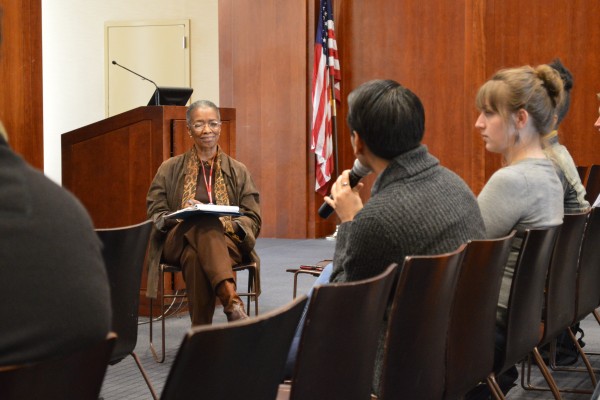Fordham Students Evaluate Education for Middle States
Fordham students met with members of the Middle States commission to talk about their experiences as students at Fordham. (ELIZABETH LANDRY/THE OBSERVER)
April 11, 2016
On April 5, a group of over twenty students from Lincoln Center campus came to the 12th floor lounge to share their thoughts on the school with two members of the Middle States evaluation team. Though criticism was welcomed, the audience stuck largely to praise.
Over the past three years, Fordham University has engaged in an institutional self-study in preparation for 2016’s decennial reaccreditation process. As part of the process, the evaluation team must gauge Fordham’s academic and administrative programs and procedures. From April 3 to 6 they participated in several events that allowed them to gain insight into the University. According to the Middle States mission statement the “accreditation process ensures institutional accountability, self-appraisal, improvement, and innovation through peer review and the rigorous application of standards within the context of institutional mission.”
The Open Student Forum, to which all students were invited by email, was a video conference between the twelfth floor lounge and a conference room in Cunniffe House at Rose Hill. Only two students attended there, including one who was reporting on the event for The Fordham Ram.
Pat Carey, Associate Vice Provost for Diversity Initiatives and Associate Dean for Student Services and Public Affairs in the Steinhardt School of Education at NYU, began by introducing herself and the other member of the team, Professor Lowell Gustafson of Villanova University.
The standards they individually focus on, they said, consist of admissions, student services, university mission and faculty.
At first, the energy level was low. Once given questions, however, the students produced a chorus of praise for Fordham.
A few themes arose through the discussion, including the Core Curriculum, Fordham’s various service programs, cohesion between the campuses and how the school facilitates easy contact between faculty and students.
One student who identified herself as a Commuter Freshmen Mentor (CFM) and a member of the Black Student Alliance (BSA) said, “A Fordham education entails a diverse knowledge base, just pointing to the Core. It opens your mind up to a lot of different perspectives.” Several students agreed.
One important part of the evaluation is whether or not students experience the school’s mission. According to the Fordham University website, its mission statement says that it “is committed to the discovery of Wisdom and the transmission of Learning, through research and thorough undergraduate, graduate and professional education of the highest quality. Guided by its Catholic and Jesuit traditions, Fordham fosters the intellectual, moral and religious development of its students and prepares them for leadership in a global society.”
Chelsea Landman, FCLC ‘16, who said she was secretary of the Jesuit Honor Society and a Resident Assistant in McKeon Hall, said that in her time as a Resident Assistant she saw how “[Fordham] does educate you mind, body and soul. You learn inside and outside the classroom how what you do can influence the world.”
Another student brought up the Dorothy Day Center and Global Outreach program, among other service opportunities. “The amount of student involvement and interest and engagement that these programs bring beyond our classrooms is phenomenal,” he said. “The institution has its mission of wanting us to be thinkers and scholars but also real people, in the real world, working with real people.”
Devon Badolato, FCLC ‘16 and coordinator for the CFM program emphasized the uniqueness of Fordham’s student support system. “I’ve received so much advice from the deans,” she said. “I’ll often go and just talk to them, and develop a personal relationship.”
A doctoral student added, “I’m impressed by how the faculty here is so open-minded to skepticism to different theories in research. As far as a research focus, they want to see what you want to find out, instead of forcing you to go their way.”
When Carey asked about student representation in university governance, students staunchly defended their position.
James Barry, FCLC ‘18 and a member of the Student Advisory Council who is also helping with the RFP process to decide a new food service provider, assured Carey and Gustafson that students have representatives with a voice, and talked about his participation.
Another student who said she was involved with the Student Affairs and the Fordham Athletics Committee pointed out that the RFP process and the new Diversity Task Force are only happening because of the student voice.
With some prompting, students did offer critiques of certain aspects of the Fordham experience.
“My biggest change would be integrating the two campuses,” one said. “It seems like all the great classes are over at Rose Hill but that’s an hour-long commute.”
“As for athletics and intramurals here, there’s virtually none of that,” he continued. “When you reach out you don’t really find those resources at times.”
A Communication and Media Studies major said, “I love my classes here, but I feel like I learned all my practical skills through internships. I took one practical class and then was like, ‘where’s the rest of them?’”
The last student to speak said, “The Core is so huge but sometimes there aren’t as many classes at Lincoln Center… to get Core credit, it has to be taken at your campus. Sometimes a certain class that will help you decide what your major will be isn’t offered at your campus until two semesters from now.”
“Perfect,” said Gustafson, before the Middle States committee rushed off to the next evaluative meeting.












